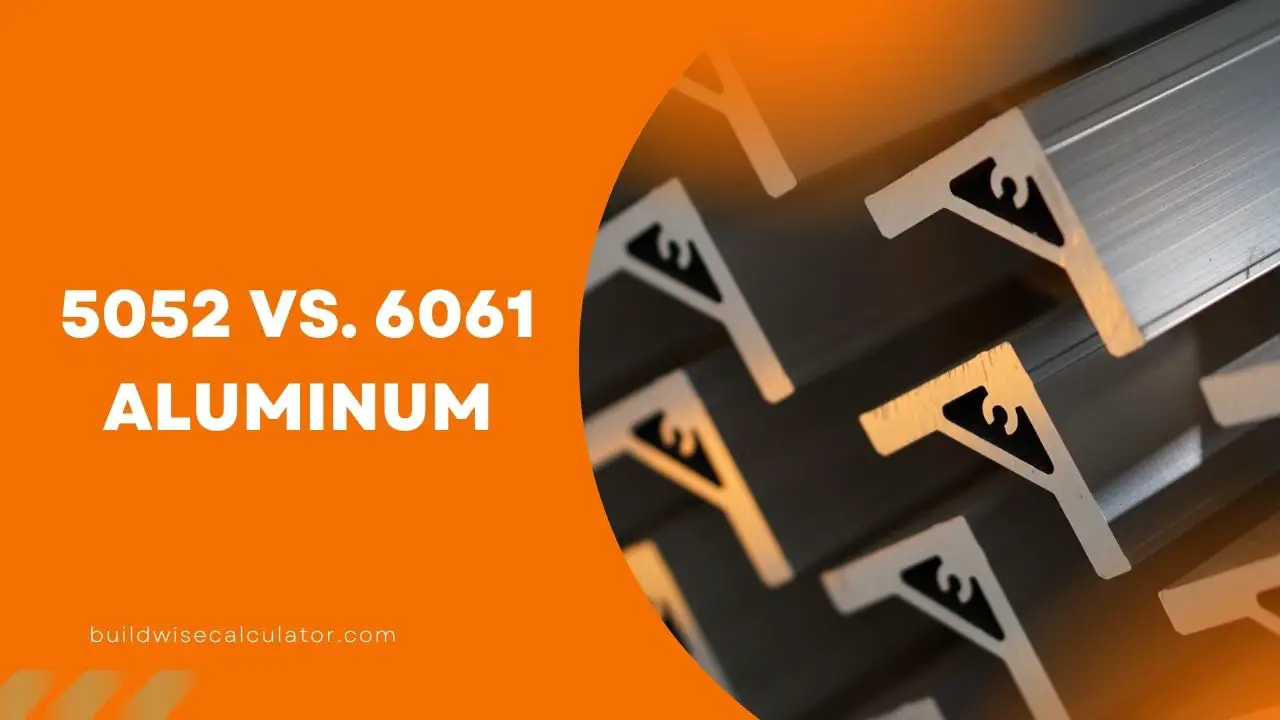5052 vs. 6061 Aluminum: Key Differences and Best Uses
Publish on: 02-Feb-2025

Aluminum is a versatile metal known for its lightweight, corrosion resistance, and strength. Among the many aluminum alloys available, 5052 and 6061 are two of the most popular choices for industrial, automotive, marine, and construction applications. But which one is right for your project? Let’s compare them based on strength, corrosion resistance, machinability, weldability, and cost to help you decide.
Composition Differences
The key difference between 5052 and 6061 lies in their composition:
-
5052 Aluminum:
-
Main Alloying Element: Magnesium (Mg).
-
Other Elements: Chromium (Cr), iron (Fe), silicon (Si), and manganese (Mn).
-
Non-Heat Treatable: Relies on work hardening for strength.
-
-
6061 Aluminum:
-
Main Alloying Elements: Magnesium (Mg) and Silicon (Si).
-
Other Elements: Copper (Cu), chromium (Cr), iron (Fe), and zinc (Zn).
-
Heat Treatable: Can be strengthened through heat treatment.
-
Strength Comparison
Strength is a critical factor when choosing between these two alloys.
-
5052 Aluminum:
-
Moderate strength.
-
Tensile Strength: ~38,000 psi.
-
Yield Strength: ~28,000 psi.
-
-
6061 Aluminum:
-
Higher strength, especially when heat-treated.
-
Tensile Strength: ~45,000 psi (annealed) to 90,000 psi (heat-treated).
-
Yield Strength: ~40,000 psi (annealed) to 40,000+ psi (heat-treated).
-
Which is Stronger?
6061 is significantly stronger than 5052, making it ideal for high-stress applications.
Corrosion Resistance
Corrosion resistance is another key consideration.
-
5052 Aluminum:
-
Excellent corrosion resistance, especially in marine and saltwater environments.
-
Resistant to chemical corrosion and oxidation.
-
Commonly used in boats, marine parts, and fuel tanks.
-
-
6061 Aluminum:
-
Good corrosion resistance, but not as effective as 5052 in harsh environments.
-
Can be anodized for extra protection.
-
Suitable for structural and aerospace applications.
-
Which is Better for Corrosion Resistance?
5052 is the clear winner, especially for marine and chemical applications.
Machinability & Workability
Machinability refers to how easily the aluminum can be cut, drilled, or shaped.
-
5052 Aluminum:
-
Fair machinability, but not ideal for precision work.
-
Softer, making it harder to machine cleanly.
-
Best for sheet metal applications.
-
-
6061 Aluminum:
-
Excellent machinability, especially in the T6 temper.
-
Easy to drill, cut, or machine.
-
Ideal for CNC machining and precision components.
-
Which is Easier to Machine?
6061 is the better choice for machining.
Weldability
Weldability is crucial for fabrication.
-
5052 Aluminum:
-
Excellent weldability.
-
Welds easily and strongly without cracking.
-
Used for fuel tanks, boats, and pressure vessels.
-
-
6061 Aluminum:
-
Good weldability, but requires special techniques to avoid cracking.
-
Post-weld heat treatment may be needed for stronger welds.
-
Used in structural applications.
-
Which is Easier to Weld?
5052 is easier to weld and doesn’t require post-weld heat treatment.
Formability & Bending
Formability determines how well the aluminum can be bent or shaped.
-
5052 Aluminum:
-
Excellent formability.
-
Can be easily bent and shaped.
-
Ideal for sheet metal and automotive panels.
-
-
6061 Aluminum:
-
Poor formability, especially in the T6 condition.
-
Prone to cracking when bent.
-
Best for machined parts rather than formed parts.
-
Which is Easier to Form?
5052 is the better choice for bending and shaping.
Cost Comparison
-
5052 Aluminum: Generally cheaper.
-
6061 Aluminum: More expensive due to its higher strength and heat treatment capabilities.
If budget is a concern, 5052 is the more cost-effective option.
Best Uses & Applications
-
5052 Aluminum:
-
Marine applications (boats, shipbuilding).
-
Automotive parts (fuel tanks, truck trailers).
-
Pressure vessels and chemical storage tanks.
-
Roofing and outdoor structures.
-
-
6061 Aluminum:
-
Aerospace and aircraft components.
-
Automotive frames and structural parts.
-
Bicycle frames and sporting goods.
-
CNC machined parts and heavy-duty structural applications.
-
Final Comparison Table
| Property | 5052 Aluminum | 6061 Aluminum |
|---|---|---|
| Strength | Moderate | High |
| Corrosion Resistance | Excellent (Best for marine use) | Good (Can be anodized for better protection) |
| Machinability | Fair | Excellent (Best for CNC machining) |
| Weldability | Excellent | Good (Requires special techniques) |
| Formability | Excellent (Easily bent & shaped) | Poor (May crack when bent) |
| Heat Treatable? | No | Yes |
| Cost | Lower | Higher |
| Best Used For | Marine, automotive, sheet metal, fuel tanks | Aerospace, machining, structural, heavy-duty applications |
Conclusion: Which One Should You Choose?
-
Choose 5052 Aluminum if:
You need excellent corrosion resistance, formability, and weldability at a lower cost. It’s ideal for marine, automotive, and sheet metal applications. -
Choose 6061 Aluminum if:
You need high strength, machinability, and heat treatment capabilities. It’s best for structural, aerospace, and CNC machined components.
Both alloys have unique advantages, so your choice depends on the specific needs of your project.
Frequently Asked Questions (FAQs)
Is 5052 aluminum stronger than 6061?
No, 6061 is stronger, especially when heat-treated.
Can I use 5052 aluminum instead of 6061?
It depends on the application. 5052 is better for corrosion resistance and welding, while 6061 is better for strength and machining.
Which aluminum alloy is better for marine applications?
5052 is better due to its excellent corrosion resistance in saltwater.
Which aluminum alloy is cheaper?
5052 is generally cheaper than 6061.
Can 6061 aluminum be welded?
Yes, but it requires special techniques and post-weld heat treatment to prevent cracking.
Recent Posts
How to Calculate Acreage of an Irregular Lot?
How Deep Should a Patio Base Be? Expert Tips and Material Choices
Deck Posts: Types, Materials, Pros & Cons, and Spacing
Types of Stone Wall: A Complete Guide
Mild Steel vs Carbon Steel | What is the differance?
How Deep Should a Fence Post Be?
Carpet Area vs Built-Up Area: What’s the Difference and How to Calculate?